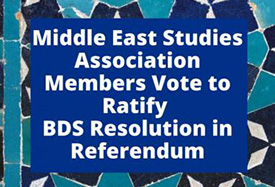 The following article is part of the IPT's Jihad University Series.
The following article is part of the IPT's Jihad University Series.
From their support for the BDS movement, to hosting terrorists to accepting terrorist tainted funding, some of the nation's top universities have become far too comfortable with connections that they would have shunned not long ago.
We see a critical need to investigate these connections and hold the universities accountable in their legitimation of the views of Middle East and Islamist terrorist groups. The IPT will be publishing new investigative pieces on a regular basis that will lift the curtain on this very repugnant side of academia today.
![]()
Middle East Studies Association Expelled from George Washington University
by A.J Caschetta
Special to IPT News
July 24, 2023
![]()
 The BDS-supporting, Israel-hating Middle East Studies Association (MESA), which since 2019 has been headquartered at the Washington, D.C., campus of the George Washington University (GW), needs a new home. It just got the boot.
The BDS-supporting, Israel-hating Middle East Studies Association (MESA), which since 2019 has been headquartered at the Washington, D.C., campus of the George Washington University (GW), needs a new home. It just got the boot.
In a very low-key, 33-word statement, Executive Director of Media Relations & University Spokesperson, Josh Grossman, verified what my sources have been telling me since May. He wrote in an email that:
"GW and MESA agreed to enter into a four-year partnership that has run its course, and we are now parting ways amicably. The agreement will expire by the end of the calendar year."
Like a Hollywood agent's somber press release on behalf of his divorcing clients, this confirmation of GW's conscious uncoupling from MESA is very different from the way it heralded their union.
From the August 22, 2019 press release announcing the new arrangement, few would deduce that the relationship was a temporary one: "The Middle East Studies Association of North America (MESA), one of the leading professional organizations for scholars and students of the Middle East, has signed a memo of understanding with the George Washington University to establish its headquarters at the Institute for Middle East Studies (IMES) in GW's Elliott School of International Affairs."
An equally enthusiastic article in the GW Hatchet on September 2, 2019, gushed that, "GW will provide a new home for [MESA's] executive functions, elevating the University's profile." It quoted MESA's president-elect, who said, "We are grateful for GWU for giving us the space and resources to establish our headquarters."
The GW press release quoted IMES interim director Dr. William Youmans, who lavished praise on his new partner, claiming it is, "impossible to overstate how foundational MESA has been to the rise of the field of Middle East studies." He called it, "a perfect match that should produce new opportunities for growth." It turns out he was wrong.
Dr. Youmans should have known that the MESA of today is a sad remnant of the professional organization it was at its founding in 1966. By the 1980s, as Martin Kramer wrote in Ivory Towers on Sand (2001), MESA had transformed the field of Middle East studies, and soon it, "rejected the idea of objective standards, disguised the vice of politicization as the virtue of commitment, and replaced proficiency with ideology."
So what led to the separation?
MESA declined to answer my questions about its break up with GW, but the timing points to its vote in March 2022, "endorsing the Palestinian call for boycotts, divestment, and sanctions of Israel" as the cause.
 The MESA BDS resolution accuses Israel of, "systematic violations of the human rights of Palestinians living under Israeli direct or indirect control," and it called for, "an academic boycott of Israeli institutions for their complicity in Israel's violations of human rights and international law through their provision of direct assistance to the military and intelligence establishments."
The MESA BDS resolution accuses Israel of, "systematic violations of the human rights of Palestinians living under Israeli direct or indirect control," and it called for, "an academic boycott of Israeli institutions for their complicity in Israel's violations of human rights and international law through their provision of direct assistance to the military and intelligence establishments."
To Holocaust survivors, the resolution of collective guilt and punishment smacked of the same boycott resolutions the Nazis instituted against German Jews. It is also factually incorrect and illogical. First, it is widely known that Israeli universities do not provide assistance to the military as institutions. Second, some Israeli universities actually commemorate "Nakba Day," hardly evidence of their complicity in suppressing Palestinian rights. Third, a boycott against ALL Israeli universities for their alleged "complicity" would not only affect Israelis – nearly one in five of all students at Israeli universities is a Palestinian. Finally, while MESA professed its undying loyalty to "academic freedom" around the world, its collective boycott of Israeli universities stands out as a stinging illustration of its anti-Semitic DNA.
After the vote, the "perfect match" between GW and MESA was on the rocks. The university immediately pushed back, asserting that it, "does not support divestment, academic boycotts, or other actions called for by BDS." It added that, "the recent vote by the independent Middle East Studies Association (MESA) is not a statement of GW's position as an institution." For good measure, it threw in that MESA, "is not a GW organization."
MESA's timing was terrible. Just four months after it moved its headquarters to the GW campus, Donald Trump signed an Executive Order on Combating Anti-Semitism. Before that, the BDS movement was a loathsome form of anti-Semitism disguised in academic garb as anti-Zionism. It was an embarrassment, but not a legal liability, for any campus that supported it. But the executive order extended Title VI of the 1964 Civil Rights Act to anti-Semitic acts, rendering the BDS movement something dangerous for an institution that receives money from the federal government.
GW is just the latest school to sever ties with MESA. As Kramer wrote recently, "MESA has been abandoned by many of the most established Middle East centers in the country," including many, "that have quietly gone missing since the end of last year [2022]." They include:
- Columbia University, Middle East Institute
- Georgetown University, Center for Contemporary Arab Studies
- Georgetown University, Department of Arabic and Islamic Studies
- Harvard University, Center for Middle Eastern Studies
- New York University, Hagop Kevorkian Center for Near Eastern Studies
- North Carolina Consortium for Middle East Studies (Duke University, Middle East Studies Center + University of North Carolina, Center for Middle East and Islamic Studies)
- University of California, Los Angeles, Center for Near Eastern Studies
- University of Chicago, Center for Middle Eastern Studies
It's not that these centers have suddenly seen the light and are appalled at MESA's vote. Many of them employ Israel-hating, BDS-supporting faculty. Dropping MESA was more of about self-preservation than morals. Columbia University will remain Ramallah on the Hudson. NYU will remain the Gaza of Greenwich Village.
One of the forces behind GW's decision to expel MESA is The Louis D. Brandeis Center for Human Rights Under Law, "an independent, unaffiliated, nonprofit organization established to advance the civil and human rights of the Jewish people and promote justice for all." On May 2, 2023, Brandeis Center General Counsel L. Rachel Lerman sent a 7-page letter to GW President Mark Wrighton urging him, "to discontinue GW's association with MESA" before he stepped down as president. Doing so, "would help GW fight anti-Semitism and discrimination on its campus" as well as, "alleviate some of the hostility Jewish and Israeli students encounter at GW." The pressure was on.
Wrighton responded by reiterating GW's opposition to the BDS movement and indicating that he was indeed reconsidering the university's hosting arrangement with MESA.
Dr. Miriam F. Elman is Executive Director of the Academic Engagement Network, an independently run non-profit that works to oppose anti-Semitism in academia. When asked for a comment, the delighted Elman told me that, "it's good to see that GW officials have now concluded that continuing to house MESA's headquarters is inconsistent with GW's values, its rejection of BDS, and its commitment to open inquiry, scholarly exchange, and academic freedom. Failing to disaffiliate was enabling MESA's academic boycott and was essentially making GW complicit in MESA's discrimination."
If universities continue to shun MESA at the current rate, its search for a new host could be a difficult one. Perhaps it plans to return to the University of Arizona, which it left in 2019 for GW. This option seems unlikely since the University of Arizona's Center for Middle Eastern Studies (CMES) severed ties with MESA in 2022, but MESA's website currently lists CMES as an institutional member, and CMES's website still lists MESA as one of its institutional memberships.
To get to the bottom of this, I called the Center for Middle Eastern Studies at the University of Arizona. When I asked the woman who answered the phone if she could help me resolve this inconsistency, she asked where I heard that CMES had severed ties to MESA. I pointed her to several different sources. She seemed surprised and said she would check with someone in the office who knew more about the situation. After a brief hold, she returned and told me that CMES had no comment. To be certain, I asked her if she meant that she couldn't find an answer or if CMES was telling me, "No Comment." She repeated, "no comment, I have to let you go," and hung up.
If a reconciliation is in the works, the University of Arizona will face the same problems that forced GW to cut its ties with MESA.
Through its own doing, the Middle East Studies Association has become isolated, delegitimized, and well on the way to becoming a pariah. Ironically, that's exactly what its members had hoped their boycott would do to Israel.
 IPT Senior Fellow A.J. Caschetta is a principal lecturer at the Rochester Institute of Technology and a fellow at Campus Watch, a project of the Middle East Forum where he is also a Ginsberg-Milstein fellow.
IPT Senior Fellow A.J. Caschetta is a principal lecturer at the Rochester Institute of Technology and a fellow at Campus Watch, a project of the Middle East Forum where he is also a Ginsberg-Milstein fellow.
Copyright © 2023. Investigative Project on Terrorism. All rights reserved.


